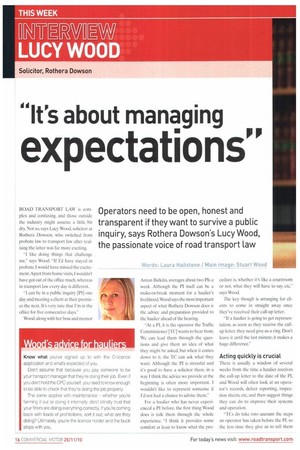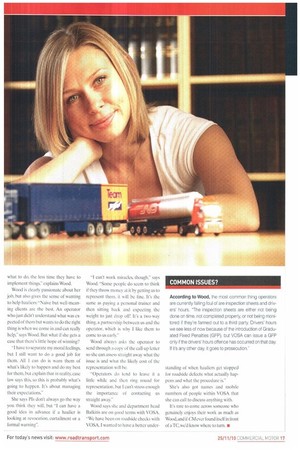it's about managing
Page 16

Page 17

If you've noticed an error in this article please click here to report it so we can fix it.
expectations"
Operators need to be open, honest and transparent if they want to survive a public inquiry, says Rothera Dowson's Lucy Wood, the passionate voice of road transport law
Words: Laura Hailstone / Main image: Stuart Wood
ROAD TRANSPORT LAW k complex and confusing, and those outside the industry might assume a little bit dry. Not so, says Lucy Wood, solicitor at Rothera Dowson, who switched from probate law to transport law after realising the latter was far more exciting.
like doing things that challenge me," says Wood, -If I'd have stayed in probate.! would have missed the excitement. Apart from home visits, I wouldn't have got out of the office much, whereas in transport law every day is different.
"I can be in a public inquiry IPIl one day and meeting a client at their premises the next. It's very rare that I'm in the office for live consecutive days."
Wood, along with her boss and mentor
Anton Balkitis, averages about two PIs a week. Although the PI itself can be a make-or-break moment for a haulier's livelihood. Wood says the most important aspect of what Rothera Dowson does is the advice and preparation provided to the haulier ahead of the hearing.
"At a Pl. it is the operator the Traffic Commissioner [TC] wants to hear from. We can lead them through the questions and give them an idea of what they might be asked, but when it comes down to it, the TC can ask what they want. Although the PI is stressful and it's good to have a solicitor there, in a way I think the advice we provide at the beginning is often more important. I wouldn't like to represent someone if I'd not had a chance to advise them."
For a haulier who has never experienced a PI before, the first thing Wood does is talk them through the whole experience. "I think it provides some comfort at least to know what the pro
cedure is, whether it's like a courtroom or not, what they will have to say, etc," says Wood.
The key though is arranging for clients to come in straight away once they've received their call-up letter.
"If a haulier is going to get representation, as soon as they receive the callup letter, they need give us a ring. Don't leave it until the last minute; it makes a huge difference."
Acting quickly is crucial
There is usually a window of several weeks from the time a haulier receives the call-up letter to the date of the PI, and Wood will often look at an operator's records, defect reporting, inspection sheets, etc, and then suggest things they can do to improve their systems and operation.
-TCTs do take into account the steps an operator has taken before the PI. so the less time they give us to tell them what to do, the less time they have to implement things:explains Wood.
Wood is clearly passionate about her job, but also gives the sense of wanting to help hauliers: "Naive but well-meaning clients are the best. An operator who just didn't understand what was expected of them but wants to do the right thing is when we come in and can really help," says Wood. But what if she gets a case that there's little hope of winning?
"I have to separate my moral feelings, but I still want to do a good job for them. All I can do is warn them of what's likely to happen and do my best for them, but explain that in reality, case law says this, so this is probably what's going to happen. It's about managing their expectations."
She says PIs don't always go the way you think they will, but "I can have a good idea in advance if a haulier is looking at revocation, curtailment or a formal warning". "I can't work miracles, though," says Wood. "Some people do seem to think if they throw money at it by getting us to represent them, it will be fine. It's the same as paying a personal trainer and then sitting back and expecting the weight to just drop off! It's a two-way thing, a partnership between us and the operator, which is why I like them to come to us early"
Wood always asks the operator to send through a copy of the call-up letter so she can assess straight away what the issue is and what the likely cost of the representation will he.
"Operators do tend to leave it a little while and then ring round for representation. hut I can't stress enough the importance of contacting us straight away."
Wood says she and department head Balkitis are on good terms with VOSA. "We have been on roadside checks with VOSA. I wanted to have a better under standing of when hauliers get stopped for roadside defects: what actually happens and what the procedure is" She's also got names and mobile numbers of people within VOSA that she can call to discuss anything with.
It's rare to come across someone who genuinely enjoys their work as much as Wood, and if CM ever found its in front of a TC, we'd know where to turn. •




































































































































